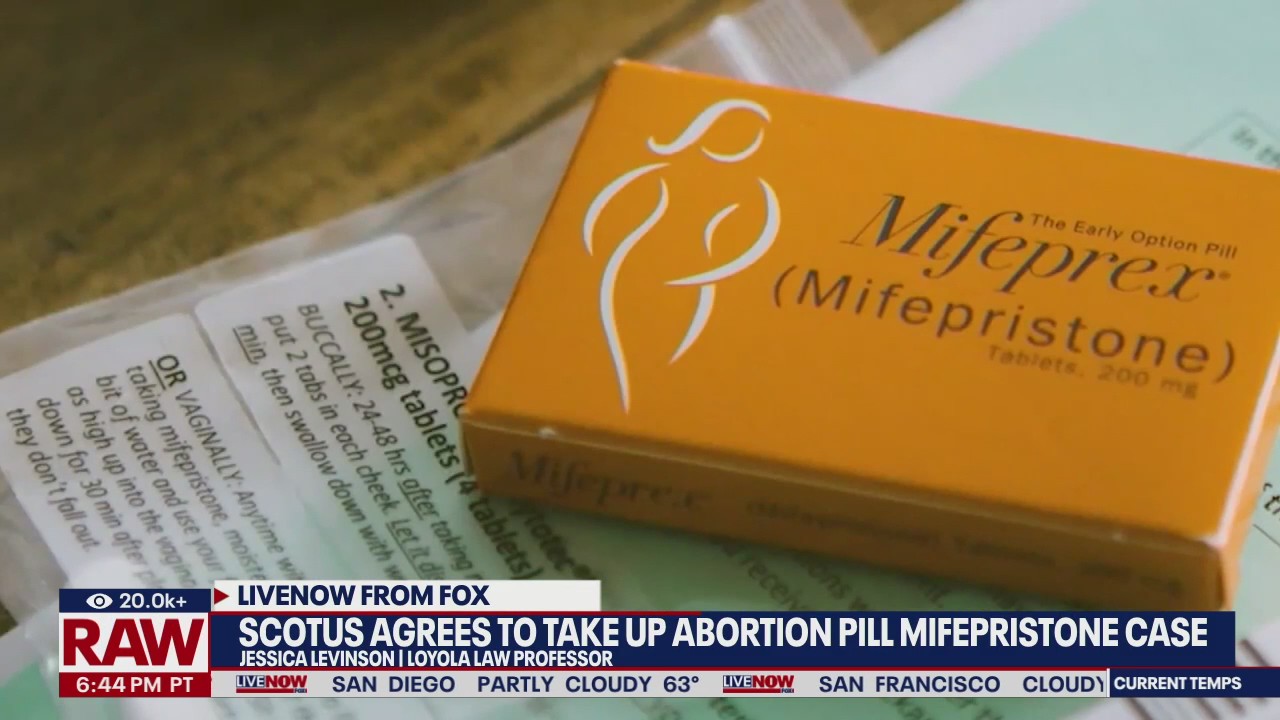Abortion pill case: Supreme Court hears arguments over limiting mifepristone

SCOTUS to decide on access to the abortion pill
The Supreme Court will hear a case on access to the abortion pill, Mifepristone. The nation's highest court agreed to consider appeals from the Biden administration. The case will be argued in the spring, with a decision likely by late June.
WASHINGTON - The U.S. Supreme Court heard arguments Tuesday over limiting access to mifepristone, one of the two pills used in the most common type of abortion in the nation.
The decision to overturn Roe v. Wade two years ago had immediate political consequences, clearing the way for bans or severe restrictions on abortion in many Republican-led states.
If the court were to uphold restrictions on medication abortions, it could roil the election landscape in races for Congress and the presidency.
What happened in court Tuesday?
In nearly 90 minutes of arguments, a consensus appeared to emerge that the abortion opponents who challenged the FDA's approval of the medication, mifepristone, and subsequent actions to ease access to it, lack the legal right or standing to sue.
Such a decision would leave in place the current rules that allow patients to receive the drug through the mail, without any need for an in-person visit with a doctor, and to take the medication to induce an abortion through 10 weeks of pregnancy. Should the court take the no-standing route, it would avoid the more politically sensitive aspects of the case.
Solicitor General Elizabeth Prelogar, the Biden administration’s top Supreme Court lawyer, said the court should dismiss the case and make clear that anti-abortion doctors and organizations don’t "come within 100 miles" of having standing.
Even three justices who were in the majority to overturn Roe posed skeptical questions about standing to the lawyer for the abortion opponents. Justices Amy Coney Barrett, Neil Gorsuch and Brett Kavanaugh are former President Donald Trump’s three Supreme Court appointees.
Barrett, for example, seemed to doubt that the doctors identified by lawyer Erin Hawley could show that were actually harmed by the FDA's actions, one of the requirements for showing standing.
"The difficulty, to me, is that the affidavits do read more like conscience objections," Barrett said.
– Mark Sherman, Associated Presss
Latest abortion battleground
A decision from Tuesday’s arguments should come by late June. But no matter the outcome, the Supreme Court has not seen its last abortion case.
Legal battles are pending over state restrictions, and new federal limits are likely if former President Donald Trump, Republicans' presumptive nominee for 2024, returns to the White House. Trump has suggested that he’d support a national ban on abortions around 15 weeks of pregnancy.
RELATED: What to know about US abortion policies heading into 2024
What led to the restrictions?

FILE - In this photo illustration, packages of Mifepristone tablets are displayed at a family planning clinic on April 13, 2023, in Rockville, Maryland. (Photo illustration by Anna Moneymaker/Getty Images)
The Supreme Court overturned the constitutional right to an abortion in June 2022. That ruling has led to bans on abortion at all stages of pregnancy in 14 states, with some exceptions.
Abortion opponents filed their challenge to mifepristone the following November and initially won a sweeping ruling six months later, revoking the drug’s approval entirely. The appeals court left intact the FDA’s initial approval of mifepristone. But it would reverse changes regulators made in 2016 and 2021 that eased some conditions for administering the drug.
The justices blocked that ruling from taking effect while the case played out, though Justices Samuel Alito, the author of 2022’s decision overturning Roe, and Clarence Thomas said they would have allowed some restrictions to take effect while the case proceeded.

Who are the Supreme Court justices?
Nine justices make up the Supreme Court. Here's a look at all nine justices who make up the U.S. Supreme Court, including the newest Associate Justice Ketanji Brown Jackson.
Next month, the justices will hear arguments over whether a federal law on emergency treatment at hospitals must include abortions, even in states that have otherwise banned them.
MORE: Supreme Court preserves access to abortion pill mifepristone for now
What is mifepristone?
Mifepristone (mifeprex), made by New York-based Danco Laboratories, is one of two drugs, along with misoprostol, used in medication abortions.
Mifepristone is taken first to dilate the cervix and block the hormone progesterone, which is needed to sustain a pregnancy. Misoprostol is taken 24 to 48 hours later, causing the uterus to contract and expel pregnancy tissue.
Mifepristone results in a completed abortion 97.4% of the time, according to U.S. studies cited in the FDA label.
But in 2.6% of cases, a surgical intervention is needed. And 0.7% of the time, the pregnancy continues.
That’s compared to a procedural abortion in a clinic, where the chance of the procedure failing to end a pregnancy "is extremely, extremely low," probably less than 0.1%, said Dr. Pratima Gupta, a board member for the American College of Obstetricians and Gynecologists.
Mifepristone was first approved in 2000 and, in 2016, the FDA approved a supplemental application based on data and information submitted by the drug manufacturer.
After reviewing that application, the agency said it determined the mifepristone is "safe and effective when used to terminate a pregnancy in accordance with the revised labeling."
Three years later, the FDA approved mifepristone tablets at 200 milligrams – a generic version of mifepristone.
The Associated Press and FOX News contributed to this report. This story was reported from Los Angeles.

